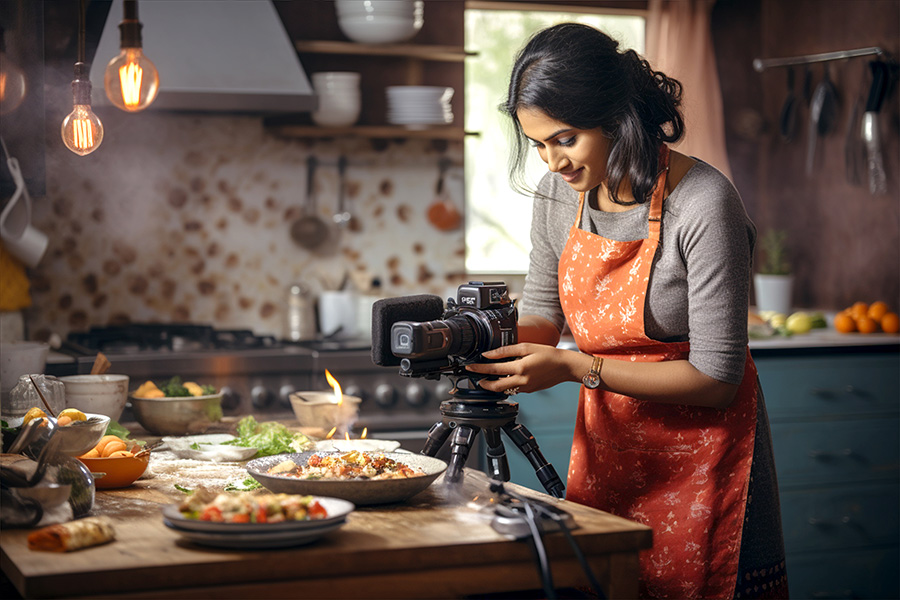India is a food lover’s paradise—diverse cuisines, rich traditions, and an ever-evolving modern palate. In this vibrant landscape, food blogging and influencing have transformed from mere hobbies into full-fledged careers. But how do you actually grow as a food influencer or blogger in India? Here’s a comprehensive roadmap to help you stand out and succeed.
1. Define Your Niche and Unique Voice
Why It Matters:
India’s food content space is bustling. To make your mark, you must offer something unique.
Niche Ideas:
Regional Cuisine Explorer – Focus on specific states like Punjabi, Bengali, South Indian, or Northeast delicacies.
Street Food Hunter – Highlight India’s bustling street food culture.
Healthy Indian Food – Ayurveda-based meals, millet recipes, vegan desi dishes.
Luxury Dining & Restaurant Reviews – Target gourmet lovers and urban audiences.
Budget Eats for Students/Travelers – Discover hidden gems with affordable eats.
Fusion or Experimental Cooking – Give classic dishes a modern twist.
Tip:
Be authentic. If you’re passionate about traditional recipes from your grandmother’s kitchen, lean into it. If café hopping is your thing, showcase that.
2. Master the Content Game: Photos, Reels, and Writing
What Works:
High-Quality Photos: Use natural light, good angles, and clean backgrounds.
Short Videos & Reels: Recipe tutorials, food reviews, taste tests, ASMR eating videos.
Blog Posts: Deep-dive articles about ingredients, recipes, food history, or culture.
Engaging Captions: Add storytelling. Describe taste, texture, experience—not just ingredients.
Must-Have Tools:
A good smartphone or DSLR
Editing apps (Lightroom, InShot, CapCut)
Tripod or stabilizer for reels
Canva for thumbnails and text graphics
3. Be Consistent and Build a Content Calendar
Regular posting builds familiarity and trust with your audience.
Example Calendar:
Monday: Street food review
Wednesday: Recipe reel
Friday: Food trivia/fact post
Sunday: Restaurant or café recommendation
Start with 3 posts a week and gradually increase.
4. Engage With Your Community
Strategies:
Reply to comments and DMs.
Run polls, Q&As, and “This or That” games.
Ask followers for their favorite dishes or spots.
Collaborate with micro-influencers or chefs.
Engagement increases loyalty and improves your reach due to Instagram’s and YouTube’s algorithms.
5. Utilize the Right Platforms
Each platform has its strengths:
Instagram: Reels, carousels, and stories for fast visual impact.
YouTube Shorts & Vlogs: Recipes, street food tours, or long-form restaurant reviews.
Blog/Website (WordPress or Medium): SEO-driven traffic and passive income from ads.
Pinterest: Great for recipe pins and gaining international visibility.
Zomato & Google Reviews: Build credibility as a food critic.
6. Network Smartly: Collaborations & Events
Collaborate With:
Other food bloggers and influencers
Local cafes, restaurants, and food festivals
Tourism boards (state-specific campaigns often need food content creators)
Attend:
F&B Events and pop-ups
Blogger meets, food walks, or launch parties
Networking helps grow both visibility and authority in your niche.
7. Learn Basic SEO & Analytics
If you’re blogging, learn how to:
Optimize your headlines and meta descriptions
Use keywords like “best biryani in Hyderabad” or “easy paneer recipes”
Track which posts perform best via Google Analytics or Instagram Insights
Data helps you refine your content and target audience.
8. Stay Updated With Trends & Festivals
In India, food is deeply tied to festivals and seasons. Ride those waves.
Examples:
Holi → Thandai and Gujiya content
Monsoon → Pakora and Chai reels
Ramadan → Iftar food trails
Navratri → Satvik recipes
Also, jump on viral trends (Dalgona coffee, Korean cheese corn dogs) but add your own spin.
9. Monetize Your Influence
Once you grow your audience, you can monetize through:
Brand Collaborations
Sponsored Restaurant Reviews
Affiliate Links for Food Products
Own E-books or Cooking Classes
YouTube AdSense & Blog Ads
Start slow and focus on value, not just numbers. Brands look for engaged followers, not just inflated stats.
10. Stay Authentic & Build Trust
Avoid over-promotion. Don’t review a restaurant positively just for money. If something didn’t work, be constructive. Your audience will value your honesty and keep coming back.
Final Thoughts
Growing as a food influencer in India requires passion, consistency, and creativity. The love for food in our country is unmatched—so when you document and share that experience with honesty and flair, you’ll not only build a loyal following but also contribute meaningfully to India’s incredible food narrative.
Author: Shakti Saran, HungerHoo
HungerHoo lists Food Influencers & Bloggers for Indian (North, South, East, West, UT, Tribal), Continental and Global Cuisines. Restaurants, Cafes, Pubs and Clubs can Find, Contact and Hire Them Directly for Barter & Paid Collabs!


